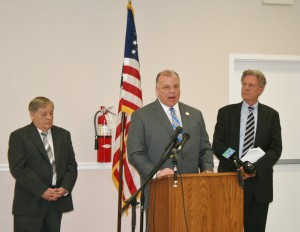
Congressman Chris Smith and Monmouth County Shaun Golden prepare to survey Hurricane Sandy damage. November, 2012
Congressman Chris Smith (R-NJ4) introduced legislation yesterday that, if enacted, would allow Superstorm Sandy victims who borrowed from the Small Business Administration to fund the rebuilding to their homes and businesses to repay those loans with the proceeds of grants from the federal department of Housing and Urban Development.
The Equity for Disaster Victims Act, co-sponsored by Congresswoman Nydia Velázquez (D-NY), would correct a con perpetrated by the government on Sandy victims in the aftermath of the strom and reform the federal government’s disaster relief programs to ensure fairness and flexibility.
“Following Sandy, victims acted in good faith to jumpstart the recovery process and begin rebuilding with SBA loans,” said Smith, who represents hard-hit Monmouth and Ocean Counties. “Those who accepted SBA loans have since found themselves ineligible for further relief though various grant programs—a circumstance they were never informed of during the loan process.”
“There is a fundamental difference between a loan with interest and a grant—it is commonsense. Those who accept SBA loans should not be precluded from future assistance merely because such assistance is not yet available,” continued Smith. “States should have the flexibility to award victims grants that will pay down the balance on the loan, and my legislation will give them that authority.”
The Disaster Victims Equity Act would allow homeowners, small businesses, and nonprofits that accepted Small Business Administration (SBA) loans following Sandy to receive U.S. Department of Housing and Urban Development (HUD) grants to repay the principal and any interest accrued on the loan. It would also make this provision permanent for any future disasters.

Senate President Steve Sweeney and Congressman Frank Pallone give lip service to Sandy victims in Keansburg as Deputy Mayor Jimmy Cocuzza, holds his breath. March 20, 2014 file photo
On March 20, 2014, 17 months after Sandy destroyed much of coastal New Jersey, Ed Kelly, a music teacher from Keansburg told NJ Senate President Steve Sweeney and Congressman Frank Pallone how he was encouraged by FEMA representatives to start rebuilding his home with the proceeds of a $150,000 SBA loan with the assurances that the loan would be repaid later by a grant. He was later told he did not qualify for available grants because his home was rebuilt through an SBA loan. Pallone backed up Kelly’s story.
Pallone said he and his colleagues are trying to fix the situation for people like Kelly, and thousands of others who are caught in the labyrinth HUD and FEMA created.
MMM asked Pallone what was necessary to fix the problem, is legislation required or is the problem one of regulations. “I don’t think legislation is necessary,” Pallone said, “we’re trying to get them to change the rules.”
Well Pallone failed to get the rules changed. As if often the case, Smith is picking up Pallone’s slack, albeit four years later, with his legislation finally introduced while Pallone has been parking his ass on the floor of the House of Representatives and refusing to meet with Sandy victims when they visit Washington pleading for help.
Last July, Smith testified before the House Committee on Small Business and urged SBA and HUD to provide an equitable solution. He told the committee of the Armstrong family in Manasquan, New Jersey who applied for and received an SBA home disaster loan after their home was destroyed by Sandy.
After liquidating their retirement savings and incurring a substantial tax penalty as a result, the family applied for relief through New Jersey’s Reconstruction, Rehabilitation, Elevation, and Mitigation (RREM) Program. The family was shocked to learn of their ineligibility for a grant award solely due to their acceptance of the SBA loan—a circumstance that they were never informed of during the loan process.
Smith testified after sending a letter to SBA and HUD requesting further guidance permitting HUD grantees to provide grant awards to Sandy victims who previously accepted SBA loans—at least for the purposes of paying down the loan. He also asked that the matter be referred to SBA’s Office of Inspector General (OIG).
“Moving forward, this bill would allow disaster victims with immediate needs to apply for SBA loan assistance with the knowledge that it will not automatically preclude them from future relief,” said Smith. “This issue arose over ten years ago in the aftermath of Hurricane Katrina and has yet to be resolved—we cannot continue to ignore it.”


















